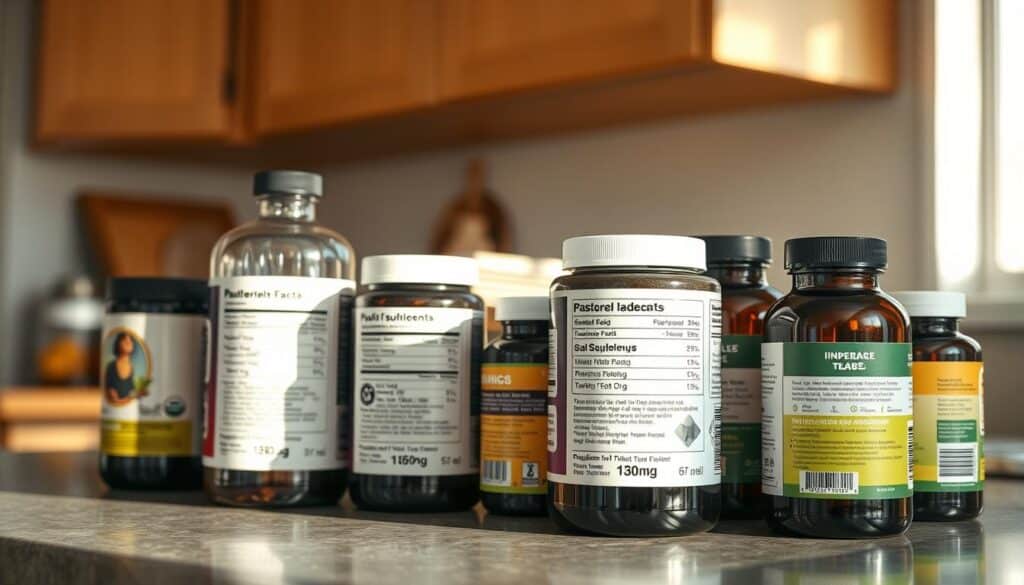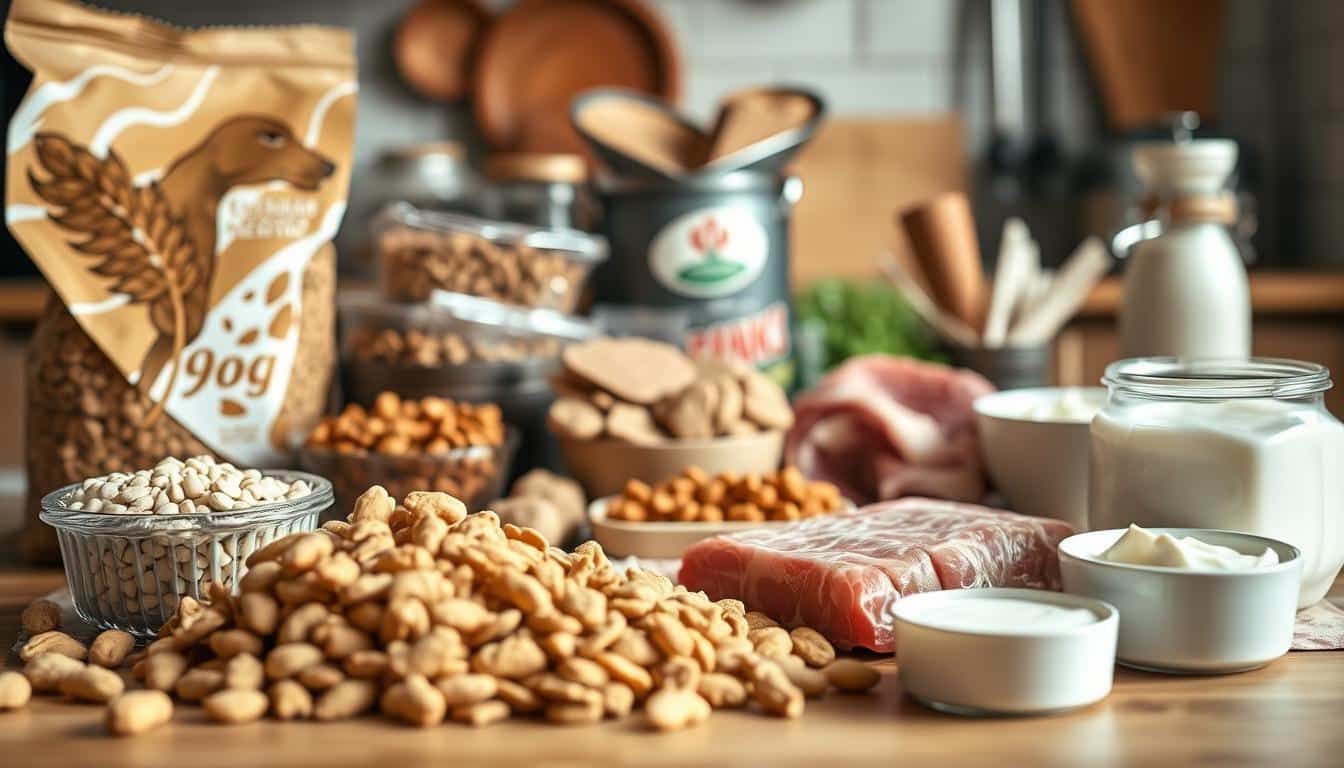Making your small dog’s food at home can be rewarding. Yet, getting their nutrition right is tricky. Most homemade meals miss important vitamins and minerals or have too much vitamin D. It’s wise to talk to a vet or a specialized nutritionist first before using supplements for homemade dog food.
Reliable dog multivitamins and specific products like Balance It canine supplement help fill nutritional gaps. They’re made to meet strict standards, removing the guesswork in homemade diets for small dogs. This way, you can be sure their meals are balanced.
Paramount Pet Health and Balance It® point out common nutrient shortages like zinc and calcium. For dog owners in the U.S. who prefer fresh food for environmental or health reasons, using supplements wisely is key. This helps prevent nutrient deficits or excesses, promoting your dog’s health in the long run.
Why supplements matter for small dogs on homemade diets
Small dogs that eat homemade food often seem healthier at the start. People choose to cook for their pets to better control ingredients and improve taste. However, it’s tricky to make these meals fully balanced. Small dogs need special care, including supplements.
Homemade dog food can have nutritional problems. It might miss out on zinc, copper, and choline. Some recipes have too much vitamin D. Not getting the right nutrients can cause dry skin and serious health issues. Store-bought food is checked for safety, but homemade meals aren’t. Owners need to add certain supplements to make sure their dogs get everything they need.
Small dogs have different needs from big dogs. They use up energy quickly and eat less food. It’s easy to give them too much or too little vitamins. They need food that’s rich in calories and nutrients. Getting the portion size right is crucial for their health.
Getting advice from vets or experts in dog nutrition is crucial when cooking for dogs. These professionals create recipes based on the dog’s needs. They use tools like Balance It®, made by a nutrition expert, to make sure the food is just right.
- Follow AAFCO and ACVN guidelines to prevent nutritional misses in homemade food.
- Measure supplements based on recipes to avoid giving too much or too little.
- Consult a dog diet expert before changing your dog’s diet or adding supplements.
Reviewing and testing a homemade dog food plan is important. It helps catch any dietary mistakes early on. This careful attention helps keep homemade food safe and healthy for dogs.
Understanding essential vitamins and minerals for homemade recipes
Creating healthy homemade dog diets calls for balance. Pet owners need to grasp which nutrients are key and their interactions. This balances the diet, prevents nutrient shortages, and avoids vitamin overdose in dogs.
Fat-soluble vitamins: A, D, E, and K — roles and overdose risks
- Vitamin A is crucial for eye health, skin, and the immune system. Not enough can lead to poor vision and dry skin. But too much can cause health issues like weight loss or bone problems.
- Vitamin D helps keep bones strong by managing calcium and phosphorus. Too little results in weak bones. However, too much vitamin D can hurt the kidneys and even cause seizures.
- Vitamin E is an antioxidant that benefits the skin and coat health. A deficiency might lead to muscle and vision issues. But, high doses can affect blood clotting.
- Vitamin K is necessary for blood clotting and healthy bones. Lacking it can cause bruising. Yet, too much is rare but harmful to blood and liver health.
B-complex vitamins and vitamin C — energy, metabolism, and immune support
- B vitamins, from B1 to B12, support energy, nerve health, and metabolism. Missing them can lead to tiredness and muscle loss. But, their water solubility lowers overdose risk, making balance key.
- Choline aids liver and brain health. Not having enough can upset the stomach and liver.
- Vitamin C functions as an antioxidant and boosts immunity. Since dogs naturally produce some vitamin C, extra doses are not always needed but can be helpful under a vet’s care.
Key minerals: calcium, phosphorus, zinc, copper, iodine, selenium — balance and interactions
- Keeping calcium and phosphorus balanced is vital for strong bones. Errors can lead to bone and metabolic problems in dogs at any age.
- Zinc and copper impact the skin, coat, and immune system. Low levels can mean a dull coat and weak immunity. But too much can upset the stomach and cause organ damage.
- Iodine is key for thyroid health. Too little leads to thyroid issues, while too much can overactivate the thyroid.
- Selenium is important for metabolism and fighting oxidation. Both too little and too much are harmful, due to its narrow safety range.
- Correct amounts of other minerals like iron and magnesium are needed for healthy blood, muscles, and nerves.
Using recipe-based or lab-tested supplements like Balance It® ensures nutrients match dog needs. This helps prevent vitamin overdose and errors in mineral balance like calcium and zinc deficiencies.
Best supplements for small dogs on homemade food
Choosing the right supplements is key for homemade meals for small breeds. Look for products with a guaranteed analysis that meet AAFCO or ACVN nutrient targets. They should also have third‑party lab assays. Small dogs need supplements with precise dosing. Make sure the product format and nutrient labels are clear.
Complete multivitamin/mineral blends designed for homemade diets (what to look for)
Look for blends that include essential vitamins and minerals. They should list amounts per serving. Make sure they have calcium, phosphorus, zinc, and other important nutrients. It’s important that they come with a guaranteed analysis and independent testing.
- Prefer formulas that include omega‑3s, essential amino acids, and digestive support like pre/probiotics.
- Look for added joint or antioxidant support such as glucosamine, chondroitin, CoQ10, astaxanthin, or lutein when broader health coverage is desired.
- Choose vet‑recommended products when available and verify lab assay results for nutrient accuracy.
Why recipe‑based supplements (like Balance It®) are useful for small dogs
Recipe‑based systems tie doses to specific recipes, not just the dog’s weight. This helps keep the right calcium:phosphorus ratios and micronutrient balance. It’s great for small serving sizes.
Balance It® is designed by a board‑certified veterinary nutritionist. It offers lab‑assayed nutrient profiles and recipe tools. Reviews often praise its ability to adjust doses based on meal size, which is perfect for small dogs with diverse diets.
Liquid vs powder vs tablet formats — dosing ease and palatability for small breeds
Liquid vitamins are simple to measure and mix into food. Flavored liquids can make it easier for picky pets or those that don’t like pills.
Powder supplements allow for exact dosing and mix well in small meals. They’re ideal when you need tight control over nutrients in a homemade diet.
Tablets and chews may be handy, but they’re not always easy to divide for tiny dogs. For accurate dosing in very small pets, consider liquids or powders. They’re usually more accurate and easier to accept.
Omega‑3s and fatty acid supplements for skin, coat, brain, and heart health
Omega fatty acids are important for a small dog’s brain, eyes, heart, and fur. Choosing the right source and dose is crucial for homemade diets. Fish oil and algal oil are good for EPA and DHA. Some vitamins for dogs also have omega‑3 to make feeding easier.
EPA and DHA benefits and recommended sources
- EPA and DHA help with brain function, joint health, and shiny coats. Puppies and older dogs benefit the most.
- Fish oil is a good source of EPA/DHA and is safe when purified and tested.
- Algal oil provides a sustainable, fish-free option and offers DHA and some EPA, depending on the brand.
- Cod liver oil has vitamins A and D plus omega‑3. Be careful not to get too much vitamin D.
Dosage considerations for small dogs and how to avoid rancidity
Small dogs need specific doses based on their weight and how often they eat. Use liquid oils for accurate measurement.
- Pick supplements with vitamin E and check they’re purified of heavy metals and PCBs.
- Follow storage instructions closely. Most need refrigeration after opening to keep them fresh; always check the expiration date.
- Be on the lookout for signs of bad fish oil, like a sour smell or discoloration. Spoiled oils can cause stomach issues and harm the body.
- Make sure added oils don’t make your pet’s food too fatty, and keep vitamins at safe levels.
Signs of deficiency and safety precautions
If your pet has a dull coat, dry skin, slow healing, or trouble seeing or learning, they might need more omega‑3. Use the right dose for small dogs, not a generic large dose.
- Don’t mix high doses of omega‑3 with certain medicines without asking a vet because of the risk of bleeding.
- Choose fish oils that show they’re tested. Ask your vet about brands like Nordic Naturals or Zesty Paws for quality assurance.
- If you’re using cod liver oil, cut down on other vitamin D sources. Recalculate the amounts of vitamins A and D to avoid health problems.
- Watch how your pet reacts to the omega‑3 dose and adjust if needed. Keep in touch with your vet or a nutrition expert for guidance.
Joint support and mobility supplements tailored to small breeds
Small breeds need special joint care because of their light bodies and fast metabolisms. Breed-specific issues also impact how joint supplements work for them. Choosing the right support can keep them moving happily without overwhelming their systems.
Glucosamine, chondroitin, and MSM — benefits for small dog joints
- Glucosamine helps fix cartilage and ease joint movement. Talk with your vet about the right dose for your small dog’s size and needs.
- Chondroitin is great for keeping cartilage moist and slowing its breakdown. It’s often paired with glucosamine for better results.
- MSM can lower inflammation and make connective tissues stronger. It’s gentle and works well with other ingredients in supplements.
- Some products add herbs like Boswellia to glucosamine for extra anti-inflammatory help. Ask your vet for product recommendations for small breeds.
When to add joint supplements
- Start supplements for older small dogs if they begin to stiffen up or slow down.
- Some breeds like dachshunds and Pomeranians need early support for their joints and discs.
- Very active small dogs might also benefit from supplements to keep their cartilage in good shape.
- Try a supplement for 8 to 12 weeks and watch if it improves your dog’s movement and mood, with your vet’s help.
Interactions with other medications and safety notes
- Glucosamine, chondroitin, and MSM are usually safe, but watch out for stomach issues or changes in poop when starting.
- Be careful with Boswellia if your dog is on painkillers or steroids. Check with your vet before adding anything new.
- Discuss the right glucosamine dose with your vet if your dog takes blood thinners, has diabetes, or is expecting puppies.
- It’s best to stick with one joint support source to avoid mix-ups. Keep track of what you give and talk about it with your vet.
Gut health: probiotics, prebiotics, and digestive enzymes
Homemade diets can boost the quality of ingredients while changing your dog’s gut health. Simple recipes might not have enough fermentable fibers and specific microbes. These are needed for good digestion and a strong immune system. Adding gut support is key, especially for small dogs. It helps them get the nutrients they need and can lessen issues like loose stools or food sensitivities.
It’s important to pick products that list specific probiotic strains for dogs and clear dosage instructions. Not all probiotics made for humans are good for dogs. The best options include specific strains like Enterococcus faecium DSM 10663 (NCIMB 10415) or certain Lactobacillus types. The dosage should be just right for small dogs, not as high as what’s given to larger breeds.
When shopping, look for formats that make it easy to give small doses. Powdered mixes, liquids, and bite‑sized chews are good choices. They help you stick to the guidelines from the maker or your vet. Right dosing means less waste and makes sure your small dog’s gut isn’t overwhelmed.
Prebiotics help the good microbes that probiotics add to your dog’s system. Ingredients like inulin, fructooligosaccharides, and beet pulp feed these beneficial bacteria. They also help make stools better. Adding prebiotics to homemade dog food is smart, especially when natural fiber is scarce.
- Probiotics for small dogs: prefer canine‑labeled products with strain IDs.
- Canine probiotic strains: pick formulas that state strain and research backing.
- Prebiotics homemade dog food: add modest amounts of pumpkin or beet pulp for gentle fiber.
Digestive enzymes like protease, amylase, and lipase are crucial. They help break down protein, starch, and fat. These enzymes aid in nutrient absorption, especially for dogs with pancreatic issues or continuous loose stools. You can sprinkle enzyme blends on your dog’s meals for quick help.
Talk to your vet or a certified veterinary nutritionist for advice and tests. They can suggest the right probiotic strains for your small dog and the best dosage. They can also guide you on whether to add digestive enzymes or prebiotics to your homemade dog food for better digestion.
Bone and dental health supplements for small dogs
Small dogs need strong bones and clean teeth, especially on homemade diets. A good blend of supplements prevents fractures and dental diseases. Always get a green light from a vet or a certified nutritionist to tailor supplements to your dog’s needs and diet.
Balancing calcium and phosphorus in homemade recipes
Calcium and phosphorus work together for healthy bones, teeth, and muscles. Their balance is crucial for growing pups and adult dogs. Using products like Balance It® ensures the right calcium to phosphorus ratio in meals. This makes homemade diets safe and nutritious.
- Precisely measure sources of calcium and phosphorus in recipes.
- Adding too many high-calcium supplements without adjusting the recipe can be harmful.
- Always recalculate ratios with seasonal or supplier ingredient changes.
Vitamin D and its narrow safe range — importance of vet guidance
Vitamin D is key for bone health but has a tight safety margin. Too much can be dangerous, leading to severe health issues. Too little can weaken bones. Be extra careful with vitamin D sources like cod liver oil and human vitamins.
- Let a pro check any vitamin D sources in your dog’s diet.
- If giving supplements for a while, monitor your dog’s blood levels.
- Be alert for vitamin D overdosing symptoms: vomiting, tiredness, and increased thirst or urination.
Dental supplements, chews, and ingredients that support oral health
Daily brushing and oral health supplements work well together. Toothpastes and water additives fight plaque. Dental chews for little dogs clean teeth by mechanical action. They are sized for small mouths to clean effectively.
- Pick chews that fit small dogs to prevent choking and enhance cleaning.
- Search for products with ingredients like enzymes or zinc that fight plaque.
- Combine cleaning with nutrients like vitamins A, C, and E for gum health, following your vet’s advice.
Handle bone-supporting minerals with care and limit vitamin D without a vet’s advice. Include dental chews and supplements in a comprehensive plan. This should involve expert advice and regular dental check-ups.
Targeted supplements for common small‑dog concerns
Small breeds often face issues like skin problems, heart conditions, and weight management. Including the right supplements in a homemade diet can help. They ease symptoms and boost health when chosen carefully and used under a vet’s advice. Here are tips and safety advice for these common issues.
Allergy and skin support
Omega‑3 fatty acids, found in fish oil or algal oil, are great for reducing inflammation. They also make your dog’s coat shiny. It’s important to find products with clear EPA and DHA levels to ensure accurate dosing for small breeds.
For seasonal allergy issues, certain botanicals can be really helpful. Ingredients like quercetin work well with nettles in products like Hista‑Paws. They lessen histamine reactions. But, always use these under a vet’s eye because they might not play well with other medications.
- Use EPA/DHA at vet‑recommended small‑dog doses.
- Try quercetin for dogs for intermittent allergy seasons, not as a daily substitute for prescribed care.
- Monitor skin improvement and watch for GI upset when starting botanicals.
Cardiac‑safe nutrition and nutrients to monitor
Making homemade food? Ensure it’s balanced to steer clear of diet-related heart problems. Key concerns include taurine deficiency and dilated cardiomyopathy, especially in certain breeds or when the diet lacks specific amino acids.
For breeds prone to heart issues, checking taurine levels is smart, particularly if their diet is low in animal protein. Some multivitamins with CoQ10 help the heart. But, make sure to follow a specialist’s dosing advice.
- Test blood taurine and cardiac markers if risk factors exist.
- Avoid excessive vitamin D; its safe range is narrow and overdosing can harm the heart and kidneys.
- Report any cough, exercise intolerance, or breathing changes promptly.
Weight management and metabolic support for toy and small breeds
Small dogs need foods that are high in calories but served in tiny amounts. Precise portion control and dosing methods are crucial for their health.
A diet with plenty of lean protein, some fat, and fiber helps them feel full. B-vitamins and ingredients like pumpkin support their metabolism and control calories. This approach helps maintain the right weight.
- Use recipe‑based dosing to adjust supplements for portion size and avoid overfeeding.
- Choose low‑calorie treats and adjust supplement concentration when feeding very small portions.
- Monitor body condition score and weight weekly to fine‑tune calories and supplement levels.
Always use targeted supplements under a vet’s care and with regular tests. This ensures treatments for allergies, heart health, and weight control are safe and effective for small dogs.
How to choose, dose, and safely integrate supplements into homemade meals
Start by carefully reading the supplement label for your small dog. Ensure it includes guaranteed analysis, serving sizes, and third-party testing if available. Look for products that meet AAFCO or follow ACVN guidelines.

Quality is key. Choose supplements made in GMP or FDA-approved facilities. Companies like Balance It® and Paramount Pet Health offer detailed information and dosing instructions.
Reading labels and verification
Like you do with human supplements, check the guaranteed analysis for each nutrient. Make sure to understand the types of vitamins and minerals listed. Also, look for signs of testing like Certificates of Analysis or NSF/GMP marks. Supplements that comply with AAFCO give extra confidence.
Weighing recipes and recipe‑based dosing
Use a digital scale and recipe builders that calculate nutrients by recipe volume. This way, you can align supplement amounts directly with the size of each portion. Balance It® offers nutrient values in ways that make small-dog dosing easy.
- Weigh cooked ingredients after cooling for consistency.
- Translate supplement doses into teaspoons or grams for precise meal additions.
- Consider liquid supplements for very small dose adjustments.
Monitoring results and signs to watch for
Keep a close eye on your dog’s health when supplementing. Look for changes in coat, energy, appetite, and stool quality. Note any differences after starting supplements to spot potential issues.
- Get starting bloodwork and follow-up tests to catch nutrient imbalances.
- Be alert for signs of deficiencies like dull coats or poor growth.
- Watch for reactions from too much supplementation, such as vomiting or excessive thirst.
Always speak with a vet or a nutrition expert before making big changes. They’ll help you safely dose supplements and adjust your dog’s diet as needed. Regular checks help keep your homemade meals well-balanced for your pet’s health.
Conclusion
Making dog food at home lets you choose fresh ingredients and control what your pet eats. Yet, it can be tricky. If you don’t follow recipes or add supplements right, your dog could miss out on important nutrients. Good supplements for small dogs include multivitamins, omega-3 fatty acids, and extras for digestion or joints. This helps your pet stay healthy, without getting too much or too little of anything.
Talking to a vet or a pet nutrition expert before starting on home-cooked meals is smart. They know how to adjust supplement amounts for smaller dogs. They can suggest trustworthy products like Balance It® or liquid vitamins from Paramount Pet Health. These options give your dog the right amount of nutrients for small meals.
When cooking for your dog, use tools like recipe builders and follow expert advice from AAFCO and ACVN. Weighing ingredients helps keep meals balanced. Watch your dog’s weight and energy levels to see how they’re doing. Regular vet visits for blood tests can make sure your dog’s diet is working right. With the correct approach and constant vet guidance, homemade dog diets can be beneficial. They can help avoid nutrient shortages or too much of something that’s not good.
FAQ
Why do small dogs on homemade diets need supplements?
What are the biggest nutritional risks when feeding homemade food?
How does small‑breed physiology change supplement needs?
Should I consult a veterinarian or a board‑certified veterinary nutritionist before adding supplements?
What fat‑soluble vitamins should I watch closely and why?
Are B‑complex vitamins and vitamin C necessary supplements for dogs?
How do I balance calcium and phosphorus in homemade recipes?
What should I look for in a complete multivitamin/mineral blend?
How do recipe‑based supplements like Balance It® help small dogs?
Which supplement format is best for tiny dogs: liquid, powder or tablet?
What are the benefits of EPA and DHA, and what sources are recommended?
How should I dose omega‑3s and avoid rancidity?
When should I add joint supplements like glucosamine, chondroitin, or MSM?
Are there medication interactions or safety concerns with botanical joint aids?
Why is gut microbiome support important for homemade diets?
How do I choose canine‑specific probiotics and CFU for a small dog?
Which prebiotics or digestive enzymes are useful in homemade recipes?
How can I support bone and dental health in a homemade feeding plan?
What cardiac nutrients should I monitor for small dogs on homemade diets?
What supplements help with allergies and skin issues in small breeds?
How do I read supplement labels and verify quality?
How should I weigh recipes and apply recipe‑based dosing for small dogs?
What signs indicate nutrient deficiency or oversupplementation?
Can supplements replace veterinary oversight when feeding homemade food?
Which keywords and product features should I prioritize when researching supplements?
Content created with the help of Artificial Intelligence.



